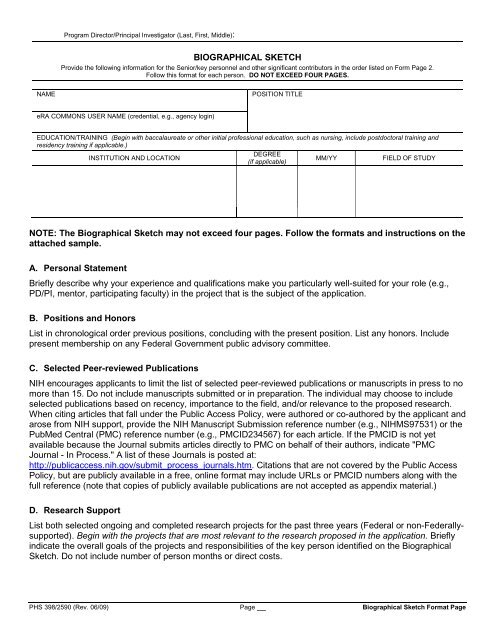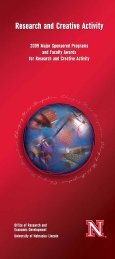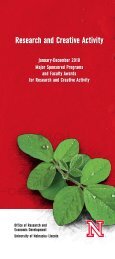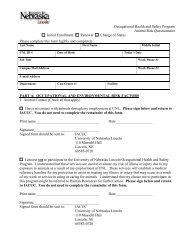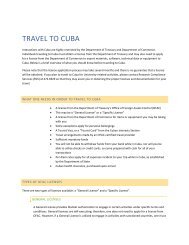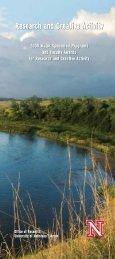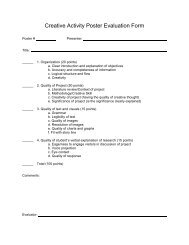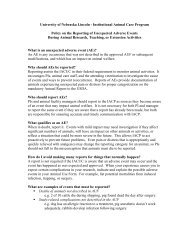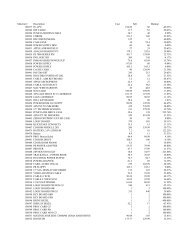PHS 398/2590 (Rev. 06/09), Biographical Sketch Format Page
PHS 398/2590 (Rev. 06/09), Biographical Sketch Format Page
PHS 398/2590 (Rev. 06/09), Biographical Sketch Format Page
Create successful ePaper yourself
Turn your PDF publications into a flip-book with our unique Google optimized e-Paper software.
Program Director/Principal Investigator (Last, First, Middle):<br />
BIOGRAPHICAL SKETCH<br />
Provide the following information for the Senior/key personnel and other significant contributors in the order listed on Form <strong>Page</strong> 2.<br />
Follow this format for each person. DO NOT EXCEED FOUR PAGES.<br />
NAME<br />
POSITION TITLE<br />
eRA COMMONS USER NAME (credential, e.g., agency login)<br />
EDUCATION/TRAINING (Begin with baccalaureate or other initial professional education, such as nursing, include postdoctoral training and<br />
residency training if applicable.)<br />
DEGREE<br />
INSTITUTION AND LOCATION<br />
MM/YY<br />
FIELD OF STUDY<br />
(if applicable)<br />
NOTE: The <strong>Biographical</strong> <strong>Sketch</strong> may not exceed four pages. Follow the formats and instructions on the<br />
attached sample.<br />
A. Personal Statement<br />
Briefly describe why your experience and qualifications make you particularly well-suited for your role (e.g.,<br />
PD/PI, mentor, participating faculty) in the project that is the subject of the application.<br />
B. Positions and Honors<br />
List in chronological order previous positions, concluding with the present position. List any honors. Include<br />
present membership on any Federal Government public advisory committee.<br />
C. Selected Peer-reviewed Publications<br />
NIH encourages applicants to limit the list of selected peer-reviewed publications or manuscripts in press to no<br />
more than 15. Do not include manuscripts submitted or in preparation. The individual may choose to include<br />
selected publications based on recency, importance to the field, and/or relevance to the proposed research.<br />
When citing articles that fall under the Public Access Policy, were authored or co-authored by the applicant and<br />
arose from NIH support, provide the NIH Manuscript Submission reference number (e.g., NIHMS97531) or the<br />
PubMed Central (PMC) reference number (e.g., PMCID234567) for each article. If the PMCID is not yet<br />
available because the Journal submits articles directly to PMC on behalf of their authors, indicate "PMC<br />
Journal - In Process." A list of these Journals is posted at:<br />
http://publicaccess.nih.gov/submit_process_journals.htm. Citations that are not covered by the Public Access<br />
Policy, but are publicly available in a free, online format may include URLs or PMCID numbers along with the<br />
full reference (note that copies of publicly available publications are not accepted as appendix material.)<br />
D. Research Support<br />
List both selected ongoing and completed research projects for the past three years (Federal or non-Federallysupported).<br />
Begin with the projects that are most relevant to the research proposed in the application. Briefly<br />
indicate the overall goals of the projects and responsibilities of the key person identified on the <strong>Biographical</strong><br />
<strong>Sketch</strong>. Do not include number of person months or direct costs.<br />
<strong>PHS</strong> <strong>398</strong>/<strong>2590</strong> (<strong>Rev</strong>. <strong>06</strong>/<strong>09</strong>) <strong>Page</strong> <strong>Biographical</strong> <strong>Sketch</strong> <strong>Format</strong> <strong>Page</strong>
Program Director/Principal Investigator (Last, First, Middle): Hunt, Virginia, L.<br />
BIOGRAPHICAL SKETCH<br />
Provide the following information for the Senior/key personnel and other significant contributors in the order listed on Form <strong>Page</strong> 2.<br />
Follow this format for each person. DO NOT EXCEED FOUR PAGES.<br />
NAME<br />
Hunt, Virginia Lively<br />
eRA COMMONS USER NAME (credential, e.g., agency login)<br />
huntvl<br />
POSITION TITLE<br />
Associate Professor of Psychology<br />
EDUCATION/TRAINING (Begin with baccalaureate or other initial professional education, such as nursing, include postdoctoral training and<br />
residency training if applicable.)<br />
DEGREE<br />
INSTITUTION AND LOCATION<br />
MM/YY<br />
FIELD OF STUDY<br />
(if applicable)<br />
University of California, Berkeley B.S. 05/90 Psychology<br />
University of Vermont Ph.D. 05/96 Experimental<br />
Psychology<br />
University of California, Berkeley Postdoctoral 08/98 Public Health and<br />
Epidemiology<br />
A. Personal Statement<br />
The goal of the proposed research is to investigate the interaction between drug abuse and normal aging<br />
processes. Specifically, we plan to measure changes in cognitive ability and mental and physical health<br />
across a five-year period in a group of older drug users and matched controls. I have the expertise, leadership<br />
and motivation necessary to successfully carry out the proposed work. I have a broad background in<br />
psychology, with specific training and expertise in key research areas for this application. As a postdoctoral<br />
fellow at Berkeley, I carried out ethnographic and survey research and secondary data analysis on<br />
psychological aspects of drug addiction. At the Division of Intramural Research at the National Institute on<br />
Drug Abuse (NIDA), I expanded my research to include neuropsychological changes associated with addiction.<br />
As PI or co-Investigator on several previous university- and NIH-funded grants, I laid the groundwork for the<br />
proposed research by developing effective measures of disability, depression, and other psychosocial factors<br />
relevant to the aging substance abuser, and by establishing strong ties with community providers that will<br />
make it possible to recruit and track participants over time. In addition, I successfully administered the projects<br />
(e.g. staffing, research protections, budget), collaborated with other researchers, and produced several peerreviewed<br />
publications from each project. As a result of these previous experiences, I am aware of the<br />
importance of frequent communication among project members and of constructing a realistic research plan,<br />
timeline, and budget. The current application builds logically on my prior work, and I have chosen coinvestigators<br />
(Drs. Gryczynski and Newlin) who provide additional expertise in cognition, gerontology and<br />
geriatrics. In summary, I have a demonstrated record of successful and productive research projects in an<br />
area of high relevance for our aging population, and my expertise and experience have prepared me to lead<br />
the proposed project.<br />
B. Positions and Honors<br />
Positions and Employment<br />
1998-2000 Fellow, Division of Intramural Research, National Institute of Drug Abuse, Bethesda, MD<br />
2000-2002 Lecturer, Department of Psychology, Middlebury College, Middlebury, VT<br />
2001- Consultant, Coastal Psychological Services, San Francisco, CA<br />
2002-2005 Assistant Professor, Department of Psychology, Washington University, St. Louis, MO<br />
2005- Associate Professor, Department of Psychology, Washington University, St. Louis, MO<br />
<strong>PHS</strong> <strong>398</strong>/<strong>2590</strong> (<strong>Rev</strong>. <strong>06</strong>/<strong>09</strong>) <strong>Page</strong> 5 <strong>Biographical</strong> <strong>Sketch</strong> <strong>Format</strong> <strong>Page</strong>
Program Director/Principal Investigator (Last, First, Middle): Hunt, Virginia, L.<br />
Other Experience and Professional Memberships<br />
1995- Member, American Psychological Association<br />
1998- Member, Gerontological Society of America<br />
1998- Member, American Geriatrics Society<br />
2000- Associate Editor, Psychology and Aging<br />
2003- Board of Advisors, Senior Services of Eastern Missouri<br />
2003-04 NIH Peer <strong>Rev</strong>iew Committee: Psychobiology of Aging, ad hoc reviewer<br />
2005-<strong>09</strong> NIH Risk, Adult Addictions Study Section, member<br />
Honors<br />
2003 Outstanding Young Faculty Award, Washington University, St. Louis, MO<br />
2005 Excellence in Teaching, Washington University, St. Louis, MO<br />
2008 Award for Best in Interdisciplinary Ethnography, International Ethnographic Society<br />
C. Selected Peer-reviewed Publications (Selected from 42 peer-reviewed publications)<br />
Most relevant to the current application<br />
1. Merryle, R.J. & Hunt, V.L. (2004). Independent living, physical disability and substance abuse among the<br />
elderly. Psychology and Aging, 23(4), 10-22.<br />
2. Hunt, V.L, Jensen, J.L. & Crenshaw, W. (2007). Substance abuse and mental health among communitydwelling<br />
elderly. International Journal of Geriatric Psychiatry, 24(9), 1124-1135.<br />
3. Hunt, V.L, Wiechelt, S.A. & Merryle, R. (2008). Predicting the substance-abuse treatment needs of an<br />
aging population. American Journal of Public Health, 45(2), 236-245. PMCID: PMC9162292<br />
4. Hunt, V.L., Newlin, D.B. & Fishbein, D. (20<strong>09</strong>). Brain imaging in methamphetamine abusers across the lifespan.<br />
Gerontology, 46(3), 122-145.<br />
5. Hunt, V.L. & Sher, K.A. (20<strong>09</strong>). Successful intervention models for older drug-abusers: Research across<br />
the life-span. American Psychologist, in press. NIHMSID: NIHMS99135<br />
Additional recent publications of importance to the field (in chronological order)<br />
1. Gryczynski, J., Shaft, B.M., Merryle, R., & Hunt, V.L. (2002). Community based participatory research with<br />
late-life addicts. American Journal of Alcohol and Drug Abuse, 15(3), 222-238.<br />
2. Shaft, B.M., Hunt, V.L., Merryle, R., & Venturi, R. (2003). Policy implications of genetic transmission of<br />
alcohol and drug abuse in female nonusers. International Journal of Drug Policy, 30(5), 46-58.<br />
3. Hunt, V. L., Marks, A.E., Shaft, B.M., Merryle, R., & Jensen, J.L. (2004). Early-life family and community<br />
characteristics and late-life substance abuse. Journal of Applied Gerontology, 28(2),26-37.<br />
4. Hunt, V.L., Merryle, R. & Jensen, J.L. (2005). The effect of social support networks on morbidity among<br />
elderly substance abusers. Journal of the American Geriatrics Society, 57(4), 15-23.<br />
5. Hunt, V.L., Pour, B., Marks, A.E., Merryle, R. & Jensen, J.L. (2005). Aging out of methadone treatment.<br />
American Journal of Alcohol and Drug Abuse, 15(6), 134-149.<br />
6. Hunt, V.L, Marks, A.E., Venturi, R., Crenshaw, W. & Ratonian, A. (20<strong>06</strong>). Community-based intervention<br />
strategies for reducing alcohol and drug abuse in the elderly. Addiction, 104(9), 1436-16<strong>06</strong>. PMCID:<br />
PMC9000292<br />
7. Merryle, R. & Hunt, V.L. (20<strong>06</strong>). Randomized clinical trial of cotinine in older nicotine addicts. Age and<br />
Ageing, 38(2), 9-23. PMCID: PMC9002364<br />
8. Hunt, V.L., Jensen, J.L. & Merryle, R. (2008). The aging addict: ethnographic profiles of the elderly drug<br />
user. NY, NY: W. W. Norton & Company.<br />
9. Hunt, V.L. (20<strong>09</strong>). Contrasting ethnicity with race in the older alcoholic. TheJournals of Gerontology Series<br />
B: Psychological Sciences and Social Sciences, in press. PMCID: PMC Journal – In Process.<br />
10. Hunt, V.L. (20<strong>09</strong>). Intervening successfully with the older methadone patient. Journal of Applied<br />
Gerontology, 13(4), 67-79.<br />
<strong>PHS</strong> <strong>398</strong>/<strong>2590</strong> (<strong>Rev</strong>. <strong>06</strong>/<strong>09</strong>) <strong>Page</strong> 6 Continuation <strong>Format</strong> <strong>Page</strong>
Program Director/Principal Investigator (Last, First, Middle): Hunt, Virginia, L.<br />
D. Research Support<br />
Ongoing Research Support<br />
R01 DA942367-03 Hunt (PI) <strong>09</strong>/01/07-08/31/12<br />
Health trajectories and behavioral interventions among older substance abusers<br />
The goal of this study is to compare the effects of two substance abuse interventions on health outcomes in an<br />
urban population of older opiate addicts.<br />
Role: PI<br />
R01 MH922731-05 Merryle (PI) 07/15/05-<strong>06</strong>/30/10<br />
Physical disability, depression and substance abuse in the elderly<br />
The goal of this study is to identify disability and depression trajectories and demographic factors associated<br />
with substance abuse in an independently-living elderly population.<br />
Role: Co-Investigator<br />
Faculty Resources Grant, Washington University 08/15/<strong>09</strong>-08/14/11<br />
Opiate Addiction Database<br />
The goal of this project is to create an integrated database of demographic, social and biomedical information<br />
for homeless opiate abusers in two urban Missouri locations, using a number of state and local data sources.<br />
Completed Research Support<br />
K02 AG442898 Hunt (PI) <strong>09</strong>/01/<strong>06</strong>-08/31/<strong>09</strong><br />
Drug Abuse in the Elderly<br />
Independent Scientist Award: to develop a drug addiction research program with a focus on substance abuse<br />
among the elderly.<br />
Role: PI<br />
R21 AA998075 Hunt (PI) 01/01/04-12/31/<strong>06</strong><br />
Community-based intervention for alcohol abuse<br />
The goal of this project was to assess a community-based strategy for reducing alcohol abuse among older<br />
individuals.<br />
Role: Co-Investigator<br />
<strong>PHS</strong> <strong>398</strong>/<strong>2590</strong> (<strong>Rev</strong>. <strong>06</strong>/<strong>09</strong>) <strong>Page</strong> 7 Continuation <strong>Format</strong> <strong>Page</strong>


